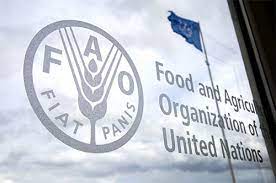The United Nations Food and Agriculture Organisation (FAO) on Friday projected that no fewer than 19.4 million Nigerians may face acute food and nutrition insecurity between June and August this year
The organisation’s Food Security Analyst, Mr. Jasper Mwesigwa, who gave this hint in Abuja at the Nigeria Cadre Harmonise Acute Food and Nutrition Insecurity Analysis programme, disclosed that currently about 14.4 million Nigerians, including 385,000 IDPs in 21 states and the FCT, were facing food crisis.
The agriculturist listed the affected states as Abia, Adamawa, Bauchi, Benue, Borno, Cross River, Edo Enugu, Gombe, Jigawa, Kaduna, Kano, Katsina, Kebbi, Lagos, Niger, Plateau, Sokoto, Taraba, Yobe, and Zamfara.
In his remarks at the event, FAO Country Representative in Nigeria, Mr. Fred Kafeero, said there was need for a holistic approach towards national food system transformation in the country to achieve the 2030 agenda.
While charging the Federal Government to commit more funds to the Cadre Harmonise Analysis to provide technical support in terms of capacity building, the Country Representative also appealed to humanitarian organizations and development partners to make use of the results of the Cadre Harmonise Analysis for planning and development.
Kafeero pointed out that doing so was required to provide the much needed interventions to save lives, sustain livelihoods and build resilience of vulnerable populations.
In addition, he advocated the incorporation of the Cadre Harmonise Analysis results in national planning, including the designing and implementation of national food systems transformation action plans.
Speaking at the event, the Permanent Secretary, Federal Ministry of Agriculture and Rural Development, Mr. Ernest Umakhihe, said the March 2022 Cadre Harmonise Analysis result was timely in view of the socioeconomic hardship being faced by ordinary Nigerians.
Represented by the Director, Project Coordinating Unit, Mr. Ubadoma Ularamu, the Permanent Secretary noted the security challenges in the country had continued to threaten food and nutrition security given the disruptive impacts on the food supply value chain.
Restating the Federal Government’s commitment to upholding the outcome and recommendations arising from the analysis, Umakhihe explained that “this is with a view to enhancing the food and nutrition security situation in the concerned states through objective intervention programmes.’’






